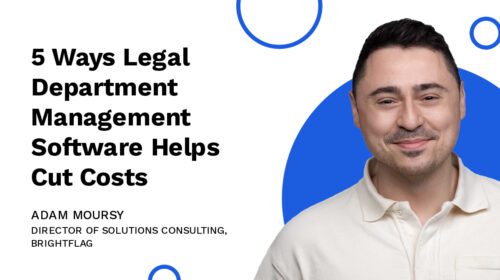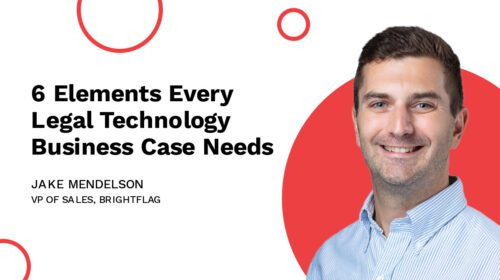3 Objections Legal Ops Must Address When Making the Case for Spend Management Software
There’s a reason why legal spend management software is so frequently the first tech investment prioritized by legal ops pros. (Well, dozens of reasons, in fact.) But no matter how clear the business case seems to you, convincing the rest of your colleagues is no guarantee.
All change inspires some degree of resistance. When the proposed change impacts something as significant as the everyday financial operations of a corporate legal department, resistance typically stems from several valid concerns.
Here are three objections legal operations professionals should anticipate and a few tactful suggestions for how to resolve each.
Objection #1: Too Little Time
The legal department is facing too many demands and has too little time. This may be the most consistent theme among in-house counsel careers, and it’s certainly the leading reason why burnout rates are approaching 80% within the industry. So why not postpone new initiatives until things calm down a bit?
It’s an understandable impulse shared by many legal department leaders, but patience is a risky strategy in this scenario. The unpredictable nature of in-house legal workloads means there’s always a chance that business demands actually increase during any planned delay. Even without those external pressures, though, operational inefficiencies within a team still tend to compound when left unaddressed.
This brings us to the hard truth: The only sustainable way to create more time for in-house lawyers is to spend more time improving the systems and processes surrounding their work.
I know you know; this falls right into the wheelhouse of legal operations. But it’s an important concept to underscore when explaining to colleagues why — counterintuitive as it may seem — legal spend management software is actually an ideal solution to the first objection it usually encounters.
The technology is specifically designed to automate or accelerate dozens of recurring admin tasks typically assigned to in-house counsel. This means time that formerly tied up the legal team in dull-but-necessary duties is suddenly free to be allocated toward more intellectually engaging and commercially valuable work.
Need concrete evidence of what those incremental time savings might amount to? You can always point to Ocado’s success story.

Objection #2: Too Much Disruption
Assuming your team recognizes the long-term value of transforming its approach to legal spend management, there’s often a separate set of concerns about the transformation process itself.
- “How do we ensure everyone—and especially law firms—actually use the new software?”
- “What happens to our old invoices and active matters?”
- “Who do we even ask in IT to help with integrations?”
The ideal software provider will have already anticipated a wide array of potential change management issues and developed a corresponding set of proactive solutions. Partnering with such a trusted guide is ultimately your best insurance against the outcomes would-be legal tech buyers have historically feared.
Of course, you’ll want to vet whether a vendor fits this description long before making the introduction to your GC. So don’t be afraid to ask pointed questions. You’ll need more than vague assurances to overcome doubt, build excitement within the department, and ensure the transition for your organization and outside law firms goes smoothly.
Not sure where to start? Focus on a few indicators that you know would be important to your team, like a desired go-live date or specific software integration.
“Live software training sessions, templates for law firm communications,maps of recommended accounting workflows — Brightflag really thought of everything. That level of support was incredibly valuable to me as a legal ops team of one.”
Crystal Wu, Legal Operations @ Ironclad

Objection #3: No Available Budget
Once colleagues see the value and trust the process, there’s still the matter of financing the investment. And given the stubborn perception of in-house legal as strictly a cost center, this objection might feel like the most difficult objection to counter. But make no mistake, legal ops should feel supremely confident when defending the cost of legal spend management software and advocating for a budget. The return on investment is concrete, diverse, and realized over both short- and long-term horizons.
Lufthansa, for example, was able to recoup its costs within one business quarter.

So if there’s any legal tech proposal worthy of reconsideration from GCs and CFOs alike, this would be the one.
Mantras to Remember
- A little time invested now saves a lot of time later.
- A trusted guide ensures a smooth journey.
- A budget will find projects with clear ROI.
Extend your powers of persuasion even further by exploring our guide: 7 Reasons to Make Spend Management Your Top Legal Tech Priority.
Need more support making the case for legal spend management software? Contact Brightflag today, we’re always happy to be a resource for you.


